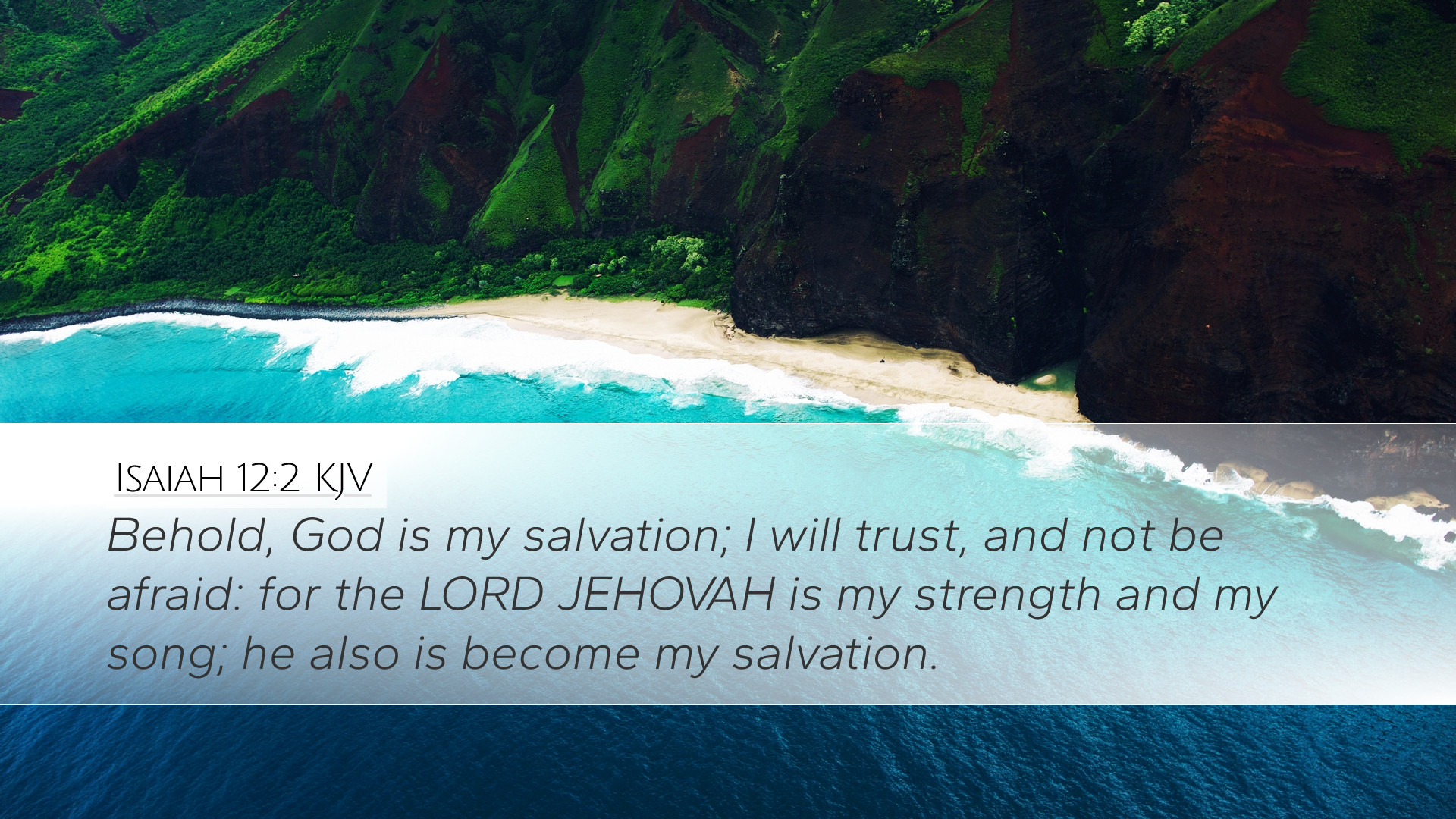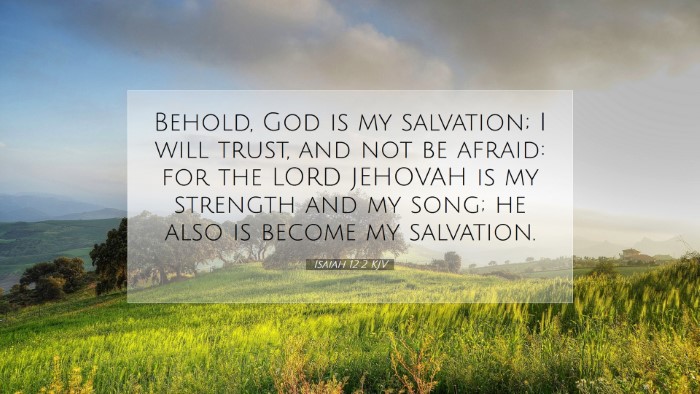Commentary on Isaiah 12:2
Isaiah 12:2 states:
“Behold, God is my salvation; I will trust, and not be afraid; for the Lord Jehovah is my strength and my song; He also is become my salvation.”
Introduction
This verse encapsulates the essence of faith and trust in God as the ultimate source of salvation. It presents a powerful affirmation of the believer's assurance in the Lord. Drawing from the insights of public domain commentators such as Matthew Henry, Albert Barnes, and Adam Clarke, we explore the depth and richness of this brief yet profound declaration.
Exegesis of Isaiah 12:2
Isaiah 12:2 can be divided into several key themes, each contributing to a broader understanding of the text.
The Alpha of Salvation
“Behold, God is my salvation”
Henry emphasizes the personal nature of this statement. The term “my salvation” indicates a close relationship between the believer and the Lord. This is not merely a distant or abstract concept but a direct ownership of salvation. In the context of Isaiah, it reflects the restoration promised to Israel, but it also anticipates the wider implications of salvation through Christ.
Trust Over Fear
“I will trust, and not be afraid”
Barnes notes the imperative command to trust, which often is juxtaposed against fear in biblical texts. Trust in God serves as an antidote to fear. This assertion comes in a time when Israel had faced considerable turmoil and uncertainty. The confident declaration serves as a profound encouragement. Clarke implies that true trust in God leads to an inner peace that overcomes life’s anxieties. This reveals the heart of faith which relinquishes the grip of fear through reliance on God's promises.
The Lord as Strength and Song
“For the Lord Jehovah is my strength and my song”
Expanding on this phrase, Henry highlights the dual aspects of God's involvement in the believer's life. God serves as both strength—the source of empowerment and support in times of trouble—and song—the theme of joy and praise. The imagery of a song indicates that the believer's response to God’s salvation should naturally flow into worship and joyous proclamation.
Divine Assurance in Salvation
“He also is become my salvation.”
Clarke points out that this phrase not only reiterates the fact of God’s salvific role but also suggests a transformative experience for the believer. Salvation is depicted as both a past act and a continual presence, reflecting a living relationship with God. The emphasis is on active engagement with God, as He not only delivers from sin but also sustains throughout life’s journey.
Theological Implications
Isaiah 12:2 holds significant theological reflections relevant for today’s readers.
The Nature of God
The verse affirms God’s character as savior. It encourages believers to consider God’s attributes—His strength, faithfulness, and readiness to save. Henry reminds us that recognizing God’s nature is foundational for trust. When believers understand God's nature, their fears diminish as they realize they are depending on someone who is mighty to save.
Faith in Adversity
In light of current events, this verse encourages faithful living amid trials. Barnes explains that prophetic texts often hold dual meanings—both for the immediate audience and for future generations. Today's church can draw encouragement from Isaiah’s declaration that trust in God can lead to peace and assurance, even amidst turmoil.
The Relationship of Joy and Faith
Isaiah proclaims joy as a key component of faith. Our understanding of God as our strength and song transforms how we experience life’s challenges. Clarke notes that joy accompanies a true understanding of God's salvation. Thus, believers are called to express gratitude and joy through worship.
Practical Application
How does Isaiah 12:2 apply to the lives of modern Christians? Pastors, theologians, and everyday believers can draw several lessons:
- Personal Assurance: Engage in personal reflection and affirmation of God's promises for individual assurance of salvation.
- Daily Trust: Cultivate habits of faith that foster daily trust in God rather than succumbing to fear.
- Worship as Response: Create a lifestyle that reflects God’s strengths through acts of worship, praise, and evangelism.
- Community Support: Encourage one another in faith, reminding fellow believers of God’s salvation and strength in difficult times.
Conclusion
Isaiah 12:2 stands as a beacon of hope, trust, and testimony for all who seek clarity in their relationship with God. The insights from Henry, Barnes, and Clarke deepen our appreciation for this text, inviting believers into a stronger faith and vibrant expression of trust and joy in the Lord. As we behold God as our salvation, may we declare with assurance, “I will trust, and not be afraid.”


